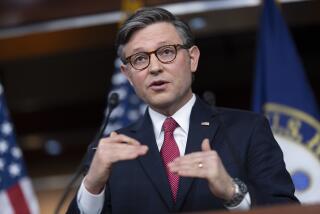Bush Reluctant to Involve U.S. Troops in Yugoslavia
- Share via
WASHINGTON — President Bush said Thursday that he is reluctant to have U.S. troops involved in Yugoslav relief operations because “we are not the world’s policeman,” but he did not rule out the possibility of such involvement.
“We are concerned about the situation in Yugoslavia,” Bush told reporters before his departure for the Earth Summit in Rio de Janeiro. “We’re going to do what we can in a humanitarian way. We’re working with the United Nations.”
But he said the United States has made “no commitment” to send troops and called talk of that “a little premature.”
Bush’s comments appeared to pour cold water on a call by Sen. Richard G. Lugar, an Indiana Republican with strong foreign policy credentials, for a U.S.-led U.N. military ultimatum to stop a Serbian offensive in Bosnia-Herzegovina.
Lugar’s proposal followed Foreign Relations Committee Chairman Claiborne Pell’s call for a naval blockade. Pell is a Rhode Island Democrat.
Sarajevo, the capital of Bosnia-Herzegovina, had a relatively quiet day Thursday, allowing residents to leave shelters to search for food and a stranded U.N. relief convoy to reach the city center.
While the guns were mostly silent in Sarajevo, Croatian forces reportedly attacked Serbs in the Mostar region to the south. Belgrade Radio said that “real hell has broken loose” and that the Serbs were retreating. It gave no details.
Serbian militias, which have been trying to create their own state from parts of newly independent Bosnia, appear to have suffered some losses in recent fighting with the majority Muslims and Croats.
After five days of heavy bombardment, only a few explosions and occasional rifle and machine-gun fire could be heard in Sarajevo.
Near U.N. headquarters, people gathered in front of apartment buildings to bargain with vendors selling onions and spinach from cars.
But signs of danger were everywhere in the devastated city. The body of a woman lay crumpled with her shopping bags in the middle of a main street that has become a hunting ground for snipers.
Streets in central Sarajevo were tangled with broken tree branches, glass, bricks and wrecked cars. Water, electricity and phone service were out throughout the city.
Fighting broke out in Bosnia after Muslims and Croats voted for independence from Yugoslavia on Feb. 29. Backed by the Serb-dominated Yugoslav army, Serbian militias seized two-thirds of Bosnia in fighting that has killed about 5,700 people and forced more than a million to flee their homes.
The arriving U.N. relief convoy brought in a U.N. team that hopes to reopen Sarajevo’s airport so food and medicine can be flown to the wrecked city, which has been besieged for two months by Serbs.
More to Read
Sign up for Essential California
The most important California stories and recommendations in your inbox every morning.
You may occasionally receive promotional content from the Los Angeles Times.













